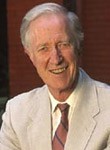Fellowships honoring Frank H.T. Rhodes to support research aiding the disadvantaged
By Daniel Aloi
With a $5 million gift from The Atlantic Philanthropies, Cornell is creating new postgraduate fellowships to further scholarship and research in areas including poverty alleviation, public health, human rights, and supporting the elderly and disadvantaged children.
The fellowships are named for Frank H.T. Rhodes -- Cornell president from 1977-1995, Atlantic board member from 1995-2008 and Atlantic board chair from 2000-2008.
"These fellowships are a testament to the profound difference that Frank H.T. Rhodes made at Cornell and The Atlantic Philanthropies," said Frederick ("Fritz") Schwarz, Atlantic board chair. "They will enable scholars to study and research areas … of fundamental interest to both [the foundation and Cornell], and also help to ensure that disadvantaged populations have access to legal expertise and representation."
The Atlantic Philanthropies, founded by Charles F. Feeney '56, is an international grant-making foundation focused on making lasting changes in the lives of disadvantaged and vulnerable people through four program areas: Aging, children and youth, population health, and reconciliation and human rights.
"It's a wonderfully generous gift, and particularly meaningful to me because it comes from Chuck Feeney's foundation," Rhodes said. "I am honored to be recognized in a way that will continue the foundation's good work."
Frank H.T. Rhodes Postdoctoral Fellowships will be housed in the Cornell Population Program (CPP) and administered by the provost; and Frank H.T. Rhodes Public Interest Law Fellowships will be administered by the dean of the Law School. There will be three fellowships in all, with two-year appointments alternating between one and two appointments at a time in either the Law School or CPP.
Candidates for the postdoctoral fellowships will be considered for research that advances Atlantic's programmatic priorities and has significance for the United States, Republic of Ireland, Northern Ireland, Vietnam, South Africa, Australia or Bermuda.
"The focus on poverty, health and well-being of families and children fits very well with the substantive themes of the Cornell Population Program," said CPP Director Elizabeth Peters. "The new fellows will be an integral part of the dynamic intellectual environment we are creating at Cornell for demographic research."
The public interest fellowships will be awarded to Law School graduates pursuing careers in the public interest. Candidates will be based in nonprofit and human rights organizations, and fellows will partner with organizations to provide legal assistance to vulnerable populations.
The program will provide "an opportunity for new graduates to gain substantive experience in work that will improve the quality and delivery of legal services to the poor, the elderly, the homeless and those deprived of their civil rights," said Karen Comstock, Law School assistant dean for public service. "This gift comes at a crucial time, as the current recession has forced organizations to cut funding for legal services to those who can least afford to lose them."
The endowment will also fund an annual meeting on campus of current and former Rhodes fellows to discuss their research and advance academic and public discourse around issues of importance to the foundation.
"I'm sure that the people these fellowships will attract are going to make a difference," Rhodes said. "Knowledgeable individuals focused on these themes can make a real difference in society, especially now when the need is greater than ever. There are such great financial and social pressures at this time, but we cannot lose sight of the need to help disadvantaged people around the world and to promote both public health and human rights."
The Atlantic Philanthropies has given away more than $5 billion since its founding in 1982. Feeney, chairman of the foundation and General Atlantic Group Ltd., anonymously gave almost $600 million to Cornell and millions more to charitable causes. His philanthropy is detailed in the 2007 book, "The Billionaire Who Wasn't: How Chuck Feeney Secretly Made and Gave Away a Fortune," by Conor O'Clery.
Get Cornell news delivered right to your inbox.
Subscribe